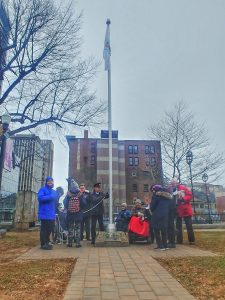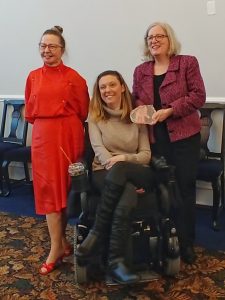[responsivevoice_button voice=”US English Female” buttontext=”Listen to Post”]
By Mary Wilson
The Oscars for 2021 are pending and there is a huge slate of movies that have been nominated, with a record-breaking number of films centered on or staring people with disabilities.
Guess how many it took to break that record?
Three.
There are three films that are about the experiences of disabled people. One, Sound of Metal, is a feature film about a drummer who is losing his hearing and does not have any hearing-impaired or D/deaf actors in leading roles (there are minor roles and extras who are hearing-impaired). Crip Camp is a documentary that extensively features disabled people about a summer camp for disabled people that helped lead to the disability rights movement in the US. Feeling Through is a short film that features a deafblind supporting actor about an abled young man helping a deafblind man get home.
I don’t want to shit all over the strides made with actually seeing representation of real disabled people in film that are made with these three films. It’s an achievement that needs to be commented on but I will stop short of celebrating something that should have happened a very long time ago.
I have seen, loved and shared Crip Camp with everyone I thought would enjoy it. It addressed so very many things in a very human way. It was everything I could have hoped for in a documentary about people.
I have not seen Sound of Metal but I want to. I will probably engage in serious suspension of disbelief to get past the “Riz Ahmed isn’t HoH or Deaf” thing and I will probably have THOUGHTS and FEELINGS about it but… I’m a punk and metal fan so I’m willing to deal with those when they come.
That leaves the third film, Feeling Through. I made the decision to watch it after reading criticism of it from deafblind attorney and activist Haben Girma. I wanted to know if I should be annoyed at it or if I should be mad at it. I try really hard not to hate films without seeing them (except films by very specific directors-that-shall-not-be-named. Those I outright refuse to watch, no matter their artistic or cultural merits) even when I’m fairly certain there will be things I find, at best, to be misrepresentations and, at worst, to be absolute bullshit. Feeling Through is beautifully shot and the actors are very good. There’s a decent amount of chemistry between Tareek (Steven Prescod), an abled but housing-insecure young man and Artie (Robert Tarango), a deafblind middle-aged man.
That’s the end of my positive takeaways. Turns out, I should be mad at Feeling Through and you probably should be mad too. Lisa Ferris has an amazing analysis of the wide variety of problems with this movie from the perspective of someone who is herself deafblind. I encourage you to read her article on it. I am mostly just going to be echoing her sentiments with my own interpretation.
First and foremost, I strongly believe that Feeling Through is inspiration porn. If you are unfamiliar with the term, “inspiration porn” was coined by writer and activist Stella Young (https://www.ted.com/talks/stella_young_i_m_not_your_inspiration_thank_you_very_much/transcript?language=en). It’s a way to describe images and stories of marginalized people, almost always disabled people, doing normal daily activities, participating in “regular” life. These images and stories are implicitly used to “inspire” abled people because if a disabled person can do something, why shouldn’t or can’t you? I could go into why this is problematic but I will leave that for a later time. If you don’t see why such images are problematic, please, just trust me for now.
Artie himself is almost a caricature of inspiration porn but the way he is written lacks the awareness of the potential problematic nature of this characterization. He is just going about his daily life, trying to get home from a date (yay for giving some hints at sexuality in disabled people I guess). I call this a caricature because even for inspiration porn, Artie’s “struggle” to participate in the world is unbelievably naïve and lacking any fundamental understanding of how self-reliant and independent disabled people are/have to be.
Artie is portrayed as relying completely upon the support of strangers to help him navigate his attempt to get home from his date. The only tools he seems to have available to help himself are a series of pre-printed questions or requests and a notebook where he can write more specific information or questions. Although that may have been the norm for deafblind people 20 years ago, the proliferation of and inexpensive access to cell phones and digital braille display devices are an inescapable demonstration of the deliberate efforts of the filmmaker to keep Artie as “helpless” as possible to help the plot.
Because Artie is demonstrated to be virtually helpless without the intervention of strangers, his presence in the film makes it feel like he is a prop, not a person. He is objectified as someone who is there to help and, in being helped, he facilitates Tareek’s growth and change. He is not even the source of the inspirarion part of the story. Tareek is given that role and Artie is the object that allows Tareek to inspire us.
My final problem is that the main character is a housing-insecure young black man. I personally want more diversity of all types in film however, in this particular case casting a black actor is the opposite of what that means to me.
Spoilers ahead.
One of the first things Tareek does when Artie requests his assistance buying a drink in a bodega is rob Artie. He uses Artie’s money to buy himself a chocolate bar and pockets $10 of the change. Yes, Artie just thoughtlessly handed over his wallet to Tareek so he could pay for Artie’s drink, showing a disturbing level of naiveté but that’s problematic for other reasons. Tareek robs Artie. That’s what happens. A young, housing-insecure black man robs a disabled dude. The role could just have easily been played by any other young actor but the director chose a black actor. He chose to have a young black man rob someone. For the record, the writer/director appears to be an abled white guy. This is the first time in my life I’ve asked out loud why this role had to be played by a black actor because I could see no other reason for it than the writer/director having unexamined racist stereotypes playing in his head while casting.
Artie, because of the manufactured naivete in this narrative, does not notice the missing money. He is so oblivious and helpless that he apparently can’t even keep track of his own cash and the theft does not impact his reliance on and trust in Tareek for the rest of the evening.
But don’t worry. After helping Artie all night, Tareek realizes that he is not entitled to Artie’s money but instead of admitting to Artie that he stole from him, Tareek leaves the $10 in a homeless man’s empty coffee cup.
Spoilers over.
So, to sum up my feelings about Feeling Through in a more concise way; This is a piece of inspiration porn that objectifies and infantilizes a grown deafblind man for the purpose of villainizing and then granting absolution to a housing-insecure young black man. There is not one bit of this story that I find unproblematic. This is not the representation I want to see of anyone in film, especially not groups who have been consistently ignored or vilified by mainstream filmmaking.


 Hi everyone! Mary here. Today we recognize the International Day of People with Disabilities. To celebrate, we attended a flag-raising, award ceremony and reception Dec. 2nd, 2019 at HRM City Hall. We had many interesting conversations, including an important take on the history of Disability Rights and Inclusion from Gerianne. She reminded us that is wasn’t that long ago, only 1980, that restaurants had the right to kick her out for no reason other than existing with a disability and wanting to eat.
Hi everyone! Mary here. Today we recognize the International Day of People with Disabilities. To celebrate, we attended a flag-raising, award ceremony and reception Dec. 2nd, 2019 at HRM City Hall. We had many interesting conversations, including an important take on the history of Disability Rights and Inclusion from Gerianne. She reminded us that is wasn’t that long ago, only 1980, that restaurants had the right to kick her out for no reason other than existing with a disability and wanting to eat.
